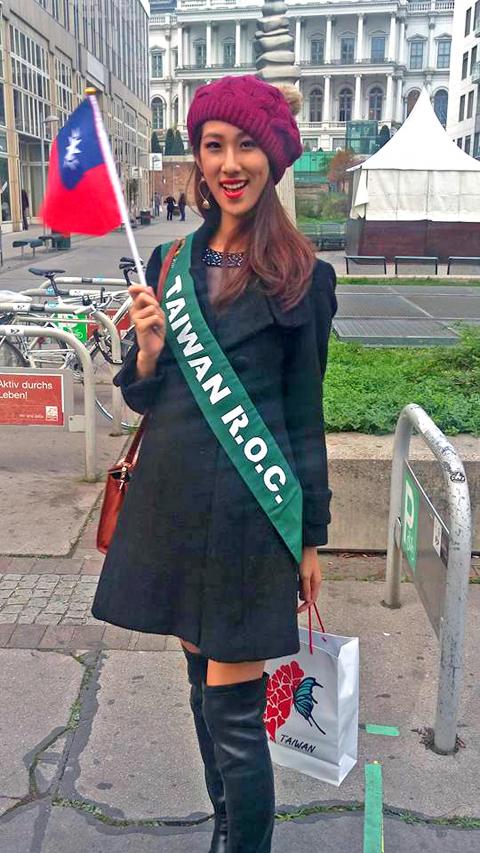Taiwan’s representative to this year’s Miss Earth contest yesterday expressed gratitude to her fans after she was ejected from the pageant for refusing to wear a sash that read “Chinese Taipei” and instead wearing one marked “Taiwan ROC.”
“I feel very appreciative to all the people who have encouraged me. Now that I have been suspended from the contest and have returned to my hotel, I have had more time to think it over,” the 22-year-old Ting Wen-yin (丁文茵) said on Facebook.
“Despite all these difficulties, I still feel grateful that this contest made me more mature and gave me a broader view of the world,” she wrote.

Photo: Screenshot from Facebook
Ting, who was representing Taiwan at the Miss Earth pageant in Vienna, two days earlier revealed that she originally wore a sash given to her by the organizers upon her arrival in Vienna that read “Taiwan ROC” — referring to Taiwan’s formal name, the Republic of China.
However, the organizers later asked Ting to replace her sash with another that read “Chinese Taipei” — the name used in most international events because of pressure from China — claiming that the original sash was misprinted by the event staff, Ting said.
Insisting that she was born in Taiwan and was representing Taiwan, Ting refused to change her sash and was banned from attending the pageant on Monday, while photographers were told not to take her picture, she added.
Ministry of Foreign Affairs spokeswoman Eleanor Wang (王珮玲) said that Ting was forced to replace her sash due to pressure from China.
Wang said that Taiwan’s Chinese International Beauty Pageants Association (中華國際選美發展交流協會), which sent Ting to Vienna, told the ministry that Ting would continue to compete in the pageant using the name “Chinese Taipei.”
Founded in 2001, the Miss Earth pageant is held to promote environmental awareness, empower women worldwide and support international environmental organizations.
This year’s competition, which had 87 contestants, runs from Wednesday last week to Dec. 5, according to the event’s Web site.
The winner of the pageant is to serve as an ambassador in environmental protection campaigns worldwide.

FALSE DOCUMENTS? Actor William Liao said he was ‘voluntarily cooperating’ with police after a suspect was accused of helping to produce false medical certificates Police yesterday questioned at least six entertainers amid allegations of evasion of compulsory military service, with Lee Chuan (李銓), a member of boy band Choc7 (超克7), and actor Daniel Chen (陳大天) among those summoned. The New Taipei City District Prosecutors’ Office in January launched an investigation into a group that was allegedly helping men dodge compulsory military service using falsified medical documents. Actor Darren Wang (王大陸) has been accused of being one of the group’s clients. As the investigation expanded, investigators at New Taipei City’s Yonghe Precinct said that other entertainers commissioned the group to obtain false documents. The main suspect, a man surnamed

The government is considering polices to increase rental subsidies for people living in social housing who get married and have children, Premier Cho Jung-tai (卓榮泰) said yesterday. During an interview with the Plain Law Movement (法律白話文) podcast, Cho said that housing prices cannot be brought down overnight without affecting banks and mortgages. Therefore, the government is focusing on providing more aid for young people by taking 3 to 5 percent of urban renewal projects and zone expropriations and using that land for social housing, he said. Single people living in social housing who get married and become parents could obtain 50 percent more

DEMOGRAPHICS: Robotics is the most promising answer to looming labor woes, the long-term care system and national contingency response, an official said Taiwan is to launch a five-year plan to boost the robotics industry in a bid to address labor shortages stemming from a declining and aging population, the Executive Yuan said yesterday. The government approved the initiative, dubbed the Smart Robotics Industry Promotion Plan, via executive order, senior officials told a post-Cabinet meeting news conference in Taipei. Taiwan’s population decline would strain the economy and the nation’s ability to care for vulnerable and elderly people, said Peter Hong (洪樂文), who heads the National Science and Technology Council’s (NSTC) Department of Engineering and Technologies. Projections show that the proportion of Taiwanese 65 or older would

Democracies must remain united in the face of a shifting geopolitical landscape, former president Tsai Ing-wen (蔡英文) told the Copenhagen Democracy Summit on Tuesday, while emphasizing the importance of Taiwan’s security to the world. “Taiwan’s security is essential to regional stability and to defending democratic values amid mounting authoritarianism,” Tsai said at the annual forum in the Danish capital. Noting a “new geopolitical landscape” in which global trade and security face “uncertainty and unpredictability,” Tsai said that democracies must remain united and be more committed to building up resilience together in the face of challenges. Resilience “allows us to absorb shocks, adapt under